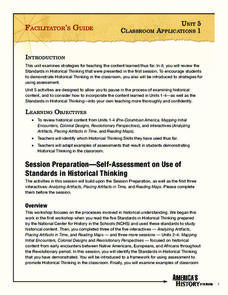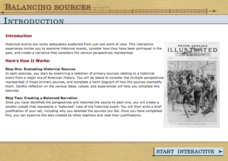Annenberg Foundation
A Nation Divided
Can a presidential election cause a civil war? Learners research the events surrounding the presidential election of 1860 in a lesson that explores America's history. Using maps, videos, and primary sources, they uncover, brainstorm, and...
Annenberg Foundation
The New Nation
The conclusion of the American Revolution brought about a new conflict—choosing the stye of government for the newly formed United States. Using the views of both Federalists and Anti-Federalists, learners work in pairs and groups to...
Annenberg Foundation
America's History in the Making: Classroom Applications One
Someone finds a time capsule 100 years from now, and it includes your family photo album. What would the photos tell that person about you and your place in history? Scholars investigate how artifacts tell stories. Using photos, maps,...
Annenberg Foundation
Mapping Initial Encounters
Picture someone's excitement of seeing a horse for the first time. How about a cow? The Columbian Exchange changed life for not only Native Americans, but also for Europeans and the entire world. The second lesson of a 22-part series...
Annenberg Foundation
Pre-Columbian America
What was life like in America before Christopher Columbus discovered the New World? Scholars investigate life in the Americas through the eyes of Native Americans in the first lesson of a 22-part series covering America's history. Using...
NET Foundation for Television
1850-1874 Notable Nebraskan: J. Sterling Morton
What are the characteristics of an outstanding citizen? Nebraskan J. Sterling Morton contributed to the formation of societal and family values in his state. Learners gather information on Morton's life accomplishments from primary...
NET Foundation for Television
1850-1874 Homestead Act Signed: The Challenges of The Plains
Start a whole new life in a land known as the Wild Wild West! Learners analyze maps, personal accounts, the Kansas-Nebraska Act, songs, and video clips to uncover life under the Homestead Act. Using their new skills, class members role...
NET Foundation for Television
1850-1874 Native Americans and Settlers
Did Western settlers receiving free land from the Homestead Act realize it wasn't really free at all? Scholars investigate the impact Western expansion had on Native American culture in the mid-1800s. They use documents, timelines, and...
NET Foundation for Television
1850-1874 The Kansas-Nebraska Act
How the Kansas-Nebraska Act created Bleeding Kansas is complicated—until scholars research and examine documents from the time. After completing activities that include mapping, photo, document analysis, and discussion, learners...
Annenberg Foundation
Balancing Sources
Pupils turn into investigative reporters throughout history to learn what it takes to balance different primary sources on the same topic. They use what they learn to create a narrative based on their own interpretation of a historic...
Annenberg Foundation
Analyzing Artifacts
If only a mask could talk! Using the interactive tool along with historical thinking skills, pupils uncover the meaning behind the various materials the resource presents. History becomes more relevant as the artifacts tell their stories...
Smithsonian Institution
Cold War
The Cold War was not necessarily always cold in temperature, but the relationship between the United States and the Soviet Union sure was frigid! Scholars read various passages, view exhibition graphics, and observe an artifact from the...
Smithsonian Institution
Korean War
North and South Korea: two regions divided. The story of the Korean War describes the events that occurred when these two regions' ideologies clashed. The resource uses various images and descriptions of artifacts, in addition to...
Smithsonian Institution
World War I
How did World War I effect the United States' status as a world power? Pupils examine a website to learn many interesting facts about American involvement during World War I. They read passages and interact with artifacts in an online...
Smithsonian Institution
Spanish American War
Today, Cuba and America sometimes struggle with diplomatic relations, but did you know that America went to war against Spain to free Cuba? Learners examine many interesting facts related to the Spanish American War using an informative...
Smithsonian Institution
Western Indian Wars
Why do many Native Americans live on reservations? An interactive resource teaches about how reservations came to be and the tragic history behind Native Americans moving from their lands. Teenagers read passages, view images, and click...
West Virginia Department of Education
Editorials: The Guiding Voice of Authority?
How much can opinion influence a news story? A standalone resource discusses the importance of John Brown's Raid through the lens of journalism. Learners analyze two different texts, one from the perspective of the North and the other of...
Mr. Nussbaum
Fort Sumter Reading Comprehension
The Battle of Fort Sumter was both the first and the least deadly battle of the American Civil War, with no soldiers lost during the lengthy bombardment. Learn more about the first shots of the Civil War with a short reading passage and...
Biz Kids
Understanding Business Ethics
After screening an episode by BizKids, scholars show what they know about business vocabulary, then take part in grand conversations about role models and ethical dilemmas.
Curated OER
Curriculum Guide For Teaching Texas History
Follow Texas history from Native Americans all the way to the 21st Century. Teachers analyze the creation of a year-long course on Texas history and use a wide range of teaching subjects and materials to guide them through the state's...
Teaching Ideas
The Victorians Pack
What was life like during the Victorian era? Images of crowded factories and lavish palaces may come to mind—and both would be accurate. Learn more about Britain during the 64-year reign of Queen Victoria with a series of informational...
Teaching Ideas
Florence Nightingale Fact Cards
When you hear the name Florence Nightingale, what comes to your mind? Wartime nurse? The International Red Cross? Florence Nightingale's many contributions to the Crimean war effort, the welfare of injured soldiers, and the future of...
Constitutional Rights Foundation
Puritan Massachusetts: Theocracy or Democracy?
Was Puritan society governed as more of a theocracy or democracy? After comparing and contrasting a series of primary source documents, middle and high schoolers form small groups and debate the question.
Southern Poverty Law Center
Teaching Hard History: A Framework for Teaching American Slavery
Pupils investigate American slavery from colonial times through the Civil War. They incorporate primary sources, video clips, and firsthand accounts to understand how the slavery issue gripped the nation. Essays, presentations, and...

























